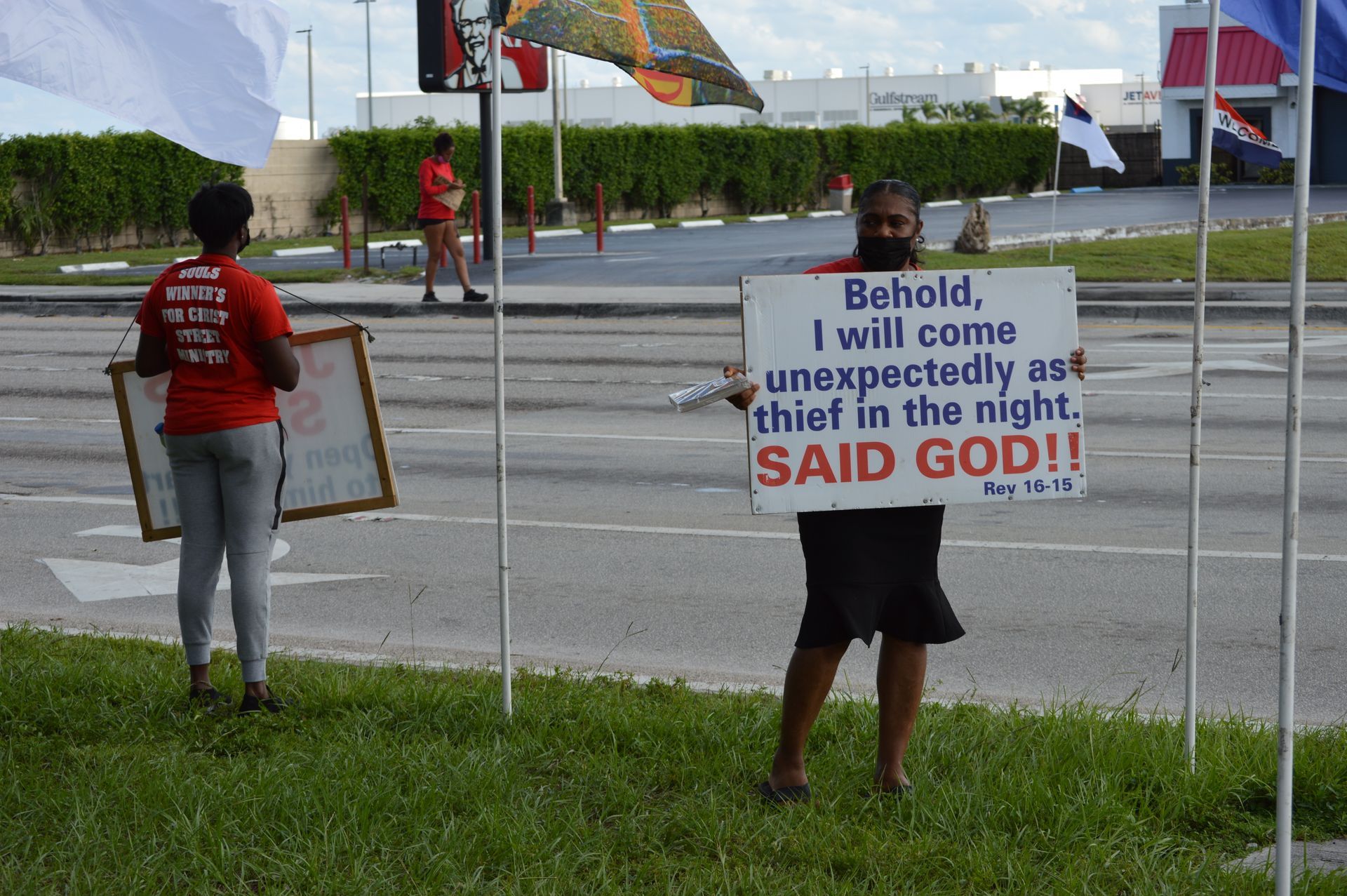Christ’s Crucifixion
Christ’s Crucifixion
Luke 23:31
“For if they do these things in a green tree, what shall be done in the dry?”
What does it mean that Jesus died for our sins?
Ernest L. Williams, Sr.
April 10, 2022
Do things that people do bother you? Some are big things that bother us like crime and
man’s inhumanity to man like the situation between Russia and Ukraine today. But even small
things sometimes get to the best of us. It bothered Will Smith to hear someone joking about his
wife’s hair. Maybe it’s the snoring, burping at the table, the noise that you may make when you
are drinking or swallowing, these small things that may bother some people. Let’s face it, there is
something that gets to all of us, no matter how different it may be from person to person, things
in life tend to get under our skin.
But we should not let these things be a barrier between our relationships with one
another. But they are barriers especially the big matters of sin that distance us from God. Why?
Because God is holy, and we struggle with holiness. And also because (according to Ps 5:4),
“For thou art not a God that hath pleasure in wickedness: neither shall evil dwell with thee.”
It is because of sin that God gave his Son to die on the cross for our sins. What does that
mean? Each person is responsible for their own actions, whether they are good or bad. The
penalty or payment for sin is separation from God because God is holy. Sin that continues leads
to death (the wages of sin is death…). The exchange for life is the payment for sin. God in the
OT required blood as the substitutionary payment for sin. Hebrews 9:22c, “and without shedding
of blood is no remission.” Israel, under Moses established an elaborate system of animal
sacrifices as an atonement (payment/justification) for sin. (He 10:4), “For it is not possible that
the blood of bulls and of goats should take away sins.”
Hebrews 9:11–14
11 But Christ being come an high priest of good things to come, by a greater and more
perfect tabernacle, not made with hands, that is to say, not of this building;
12 Neither by the blood of goats and calves, but by his own blood he entered in once into the
holy place, having obtained eternal redemption for us.
13 For if the blood of bulls and of goats, and the ashes of an heifer sprinkling the unclean,
sanctifieth to the purifying of the flesh:
14 How much more shall the blood of Christ, who through the eternal Spirit offered himself
without spot to God, purge your conscience from dead works to serve the living God?
Contextual Considerations of the Crucifixion Account
The Gospels give us the account of Christ’s crucifixion. Here is a survey of our Lord’s passion.
After Jesus is condemned by Pilate, the Jewish leaders, and the people, he is led through the
streets of Jerusalem bearing a cross. Only Luke records the account of Jesus stopping and
speaking to a host of women and others following him as he is bearing his cross.
Luke 23:27–31
27 And there followed him a great company of people, and of women, which also bewailed
and lamented him.
28 But Jesus turning unto them said, Daughters of Jerusalem, weep not for me, but weep for
yourselves, and for your children.
29 For, behold, the days are coming, in the which they shall say, Blessed are the barren, and
the wombs that never bare, and the paps which never gave suck.
30 Then shall they begin to say to the mountains, Fall on us; and to the hills, Cover us.
31 For if they do these things in a green tree, what shall be done in the dry?
This passage placed at this location in the narrative of Jesus is unique in Luke. True to his
purpose, Luke highlights Christ as the one who always has compassion on women. Before this
the soldiers took Simon, a native of north Africa, to bear the cross of Jesus (23:26).
“And when they were come to the place, which is called Calvary, there they
crucified him…” (23:33).
There are two criminals called malefactors on either side of Jesus who are also being
crucified. As the soldiers and people mocked Jesus, the soldiers offered the Lord vinegar and put
a superscription on the cross in Greek, Latin, and in Hebrew, “THIS IS THE KING OF THE
JEWS” (23:38).
“And the people stood beholding. And the rulers also with them derided him,
saying, He saved others; let him save himself, if he be Christ, the chosen of God” (23:35).
Listen to our Lord’s words on the cross.
1. Then said Jesus, Father, forgive them; for they know not what they do. And they parted
his raiment, and cast lots. (23:34)
2. And Jesus said unto him, Verily I say unto thee, Today shalt thou be with me in paradise.
(23:43)
3. In John 19 we have, “ 26 When Jesus therefore saw his mother, and the disciple standing
by, whom he loved, he saith unto his mother, Woman, behold thy son! 27 Then saith he to
the disciple, Behold thy mother! And from that hour that disciple took her unto his own
home.
4. “I thirst” (John 19:28).
5. Matthew 27: 45 Now from the sixth hour there was darkness over all the land unto the
ninth hour. 46 And about the ninth hour Jesus cried with a loud voice, saying, Eli, Eli, lama
sabachthani? that is to say, My God, my God, why hast thou forsaken me?
6. About this time the veil of the temple is rent from top to bottom. Maybe the setting for
the TV show The Walking Dead came from the Bible. Matthew records dead people
walking through Jerusalem after the Lord’s resurrection (Mt 27:52). There is also an
earthquake. Darkness covered the land, but it is midday. “When Jesus therefore had
received the vinegar, he said, It is finished: and he bowed his head, and gave up the
ghost.” (Jn 19:30).
7. And when Jesus had cried with a loud voice, he said, Father, into thy hands I commend
my spirit: and having said thus, he gave up the ghost. (Lk 23:46).
The centurion saw all that had been done, glorified God, saying, Certainly this was a
righteous man (Lk 23:47). Matthew tells us that others around the centurion were heard saying,
“Truly this was the Son of God” (Mt 27:54). Let our responses be that of and greater than that of
the centurion, “Truly this IS the Son of God.”
Matthew records that the women were there concerned about his body (Mt 27:55-56). Joseph
of Arimathea and Nicodemus privately begged Pilate to take the body of the Lord for proper
burial (Mt 27:57-60; Jn 19:38-42).
The Theology of Cross in Luke’s Account
On his way to be crucified Jesus tells the women who are weeping for him, that if they do
these things in a green tree, what shall be done in the dry? (Lk 23:31). Jesus is saying that if we
are going to be his followers, we also will not be exempted from suffering. Suffering for Christ is
a part of our walk (lifestyle) and witness for Christ. In other words, if you live and speak up and
out for Jesus, you will suffer persecution (2 Tim 3:12). Jesus even said, if any man shall come
after me, let him deny himself, take up his cross, and follow me (Mt 16:24). Further, the theology
of the cross rests upon God’s act of love in forgiving us of our sins. Jesus prayed to the Father,
“Father forgive them for they know not what they do.” Lastly, prayer is paramount on the cross.
While the people derided him, Christ prayed to the Father. Through our difficult times, let us be
ever so close to God in prayer.
Applications of the Cross
1. Jesus’ cross should make us consciously aware of our sins.
2. His cross is to make us consciously aware of God’s untiring love for us in giving his
Son to die for our sins. For God commended his love toward us, in that, while we
were yet sinners, Christ died for us (Ro 5:8).
3. The cross of Calvary is to make us consciously aware of our proclivity to sin.
4. Nothing we could or can do to cleanse ourselves from sin.
5. The biblical response for believers to live holy is not a requirement for our salvation.
However, because God saved us by his grace, our response should be to please him
by obeying his word.
6. The problem with the cross is for some to think that since Jesus died for my sins and I
don’t have to do anything to be saved, then I can live anyway I want to. This is the
wrong response. Paul anticipated this response in Romans 6. In Romans 6, Paul raises
two questions that he anticipates people will ask.
a. What shall we say then? Shall we continue in sin, that grace may abound? (Ro
6:1). Paul responds, “God forbid.”
b. What then? shall we sin, because we are not under the law, but under grace?
God forbid. (Ro 6:15).
King of my life, I crown Thee now
Thine shall the glory be
Lest I forget Thy thorn-crowned brow
Lead me to Calvary
Lest I forget Gethsemane
Lest I forget Thine agony
Lest I forget Thy love for me
Lead me to Calvary
May I be willing, Lord, to bear
Daily my cross for Thee
Even Thy cup of grief to share
Thou hast borne all for me
Lest I forget Gethsemane
Lest I forget Thine agony
Lest I forget Thy love for me
Lead me to Calvary
Living he Loved Me
Dying he saved me
Buried He carried my
My sins far away
Rising he justified me
Freed me forever
One day he’s coming back Glorious day
The cross is a good place for you and me to be. We need to spend more time at the cross. If we
settle at the cross, and see the world through the direction of the cross, our lives would be more
humbled. Too many Christians are forgetting Calvary. We sing and preach about it, but it is
becoming an afterthought. We are taking his cross, suffering, and humiliation for granted.
Its only at the cross that lives can be mended, burdens lifted, souls forgiven, and society
reconciled. Its at the cross of Calvary, Jesus’ cross that can only bind men of all color and creed
together. Men of high and low estate are equal at the foot of the cross.
At the cross, at the cross where I first saw the light,
And the burden of my heart rolled away,
It was there by faith I received my sight,
And now I am happy all the day!
Our Sermons


